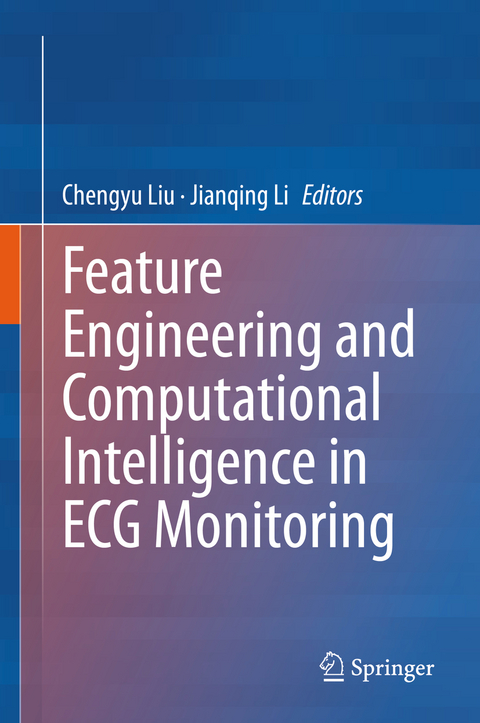
Feature Engineering and Computational Intelligence in ECG Monitoring
Springer Verlag, Singapore
978-981-15-3823-0 (ISBN)
Dr. Chengyu Liu received his B.S. and Ph.D. degrees in Biomedical Engineering from Shandong University, China, in 2005 and 2010 respectively. He completed his postdoctoral training at Shandong University, China; Newcastle University, UK; and Emory University, USA. He is currently the Interim Dean of the School of Instrument Science and Engineering at Southeast University, a Professor of the State Key Laboratory of Bioelectronics, and the founding Director of the Wearable Heart-Sleep-Emotion Intelligent Monitoring Lab at Southeast University. He is also the founding Chair of the China Physiological Signal Challenge (from 2018), which focuses on challenging ECG signal processing issues. He is a member of the journal committee of the International Federation for Medical and Biological Engineering (IFMBE), an international advisory board member for Physiological Measurement and the Journal of Medical and Biological Engineering. His research topics include wearable ECG & vital-sign monitoring, machine learning for medical big data, early detection, and device development for cardiovascular diseases. He has published over 180 journal/conference papers. Dr. Jianqing Li received his B.S. and M.S. degrees in Automatic Technology, and his Ph.D. degree in Measurement Technology and Instruments from the School of Instrument Science and Engineering, Southeast University, China, in 1986, 1990 and 2000 respectively. He is currently the Vice-President of Nanjing Medical University, a Professor at the School of Biomedical Engineering and Informatics, Nanjing Medical University, and a Professor at the School of Instrument Science and Engineering at Southeast University. He is the founding Director of the Key Laboratory of Clinical Medical Engineering in Nanjing Medical University, and the deputy Director of the Jiangsu Key Lab of Remote Measurement and Control at Southeast University, where he leads the research on medical-industry, cross-innovation cooperation, medical device development and clinical applications. His research topics include wearable medical sensors and signal processing, rehabilitation robot technology, and robot telepresence technology. He has been awarded funding for more than 20 research projects and holds over 20 patents.
Chapter 1. Feature engineering and computational intelligence in ECG monitoring – an introduction.- Chapter 2. Representative Databases for Feature Engineering and Computational Intelligence in ECG Processing.- Chapter 3. An Overview of signal quality indices on dynamic ECG signal quality assessment.- Chapter 4. Signal quality features in dynamic ECGs.- Chapter 5. Motion Artifact Suppression Method in Wearable ECG.- Chapter 6. Data Augmentation for Deep Learning based ECG analysis.- Chapter 7. Study on Automatic Classification of Arrhythmias.- Chapter 8. ECG Interpretation with deep learning.- Chapter 9. Visualizing ECG contribution into Convolutional Neural Network classification.- Chapter 10. Atrial fibrillation detection in dynamic signals.- Chapter 11. Applications of Heart rate variability in Sleep Apnea.- Chapter 12. False Alarm Rejection for ICU ECG Monitoring.- Chapter 13. Respiratory Signal Extraction from ECG Signal.- Chapter 14. Noninvasive Recording of Cardiac AutonomicNervous Activity--What’s behind ECG?.- Chapter 15. A questionnaire study on artificial intelligence and its effects on individual health and wearable device.
| Erscheinungsdatum | 06.07.2020 |
|---|---|
| Zusatzinfo | 77 Illustrations, color; 24 Illustrations, black and white; X, 268 p. 101 illus., 77 illus. in color. |
| Verlagsort | Singapore |
| Sprache | englisch |
| Maße | 155 x 235 mm |
| Themenwelt | Informatik ► Theorie / Studium ► Künstliche Intelligenz / Robotik |
| Informatik ► Weitere Themen ► Bioinformatik | |
| Medizin / Pharmazie ► Physiotherapie / Ergotherapie ► Orthopädie | |
| Naturwissenschaften ► Biologie ► Genetik / Molekularbiologie | |
| Technik ► Medizintechnik | |
| Technik ► Umwelttechnik / Biotechnologie | |
| ISBN-10 | 981-15-3823-9 / 9811538239 |
| ISBN-13 | 978-981-15-3823-0 / 9789811538230 |
| Zustand | Neuware |
| Informationen gemäß Produktsicherheitsverordnung (GPSR) | |
| Haben Sie eine Frage zum Produkt? |
aus dem Bereich


